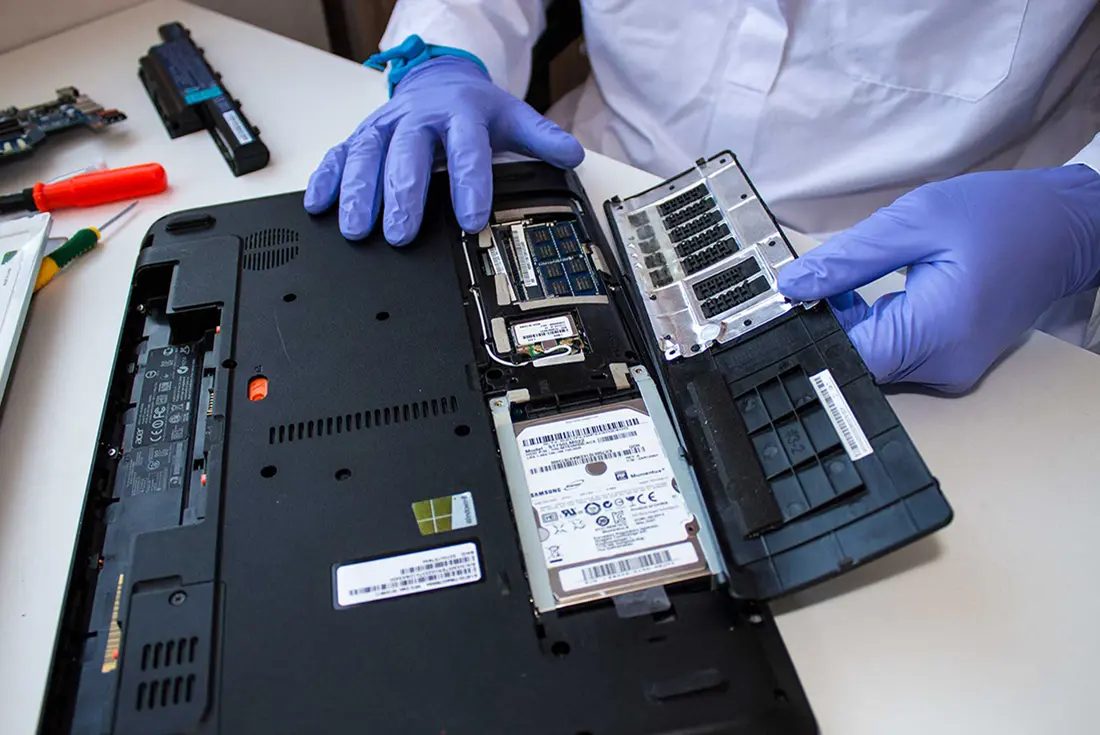
26 Jul DIY Computer Repair: 10 Common Mistakes That Can Make Things Worse
While the allure of fixing your computer yourself and saving a few bucks can be tempting, it’s not always the best approach. In fact, attempting DIY computer repair can often lead to more harm than good, especially if you’re not familiar with the intricacies of computer hardware and software. In this blog post, we’ll explore ten common mistakes that DIY enthusiasts often make when repairing computers, and how these mistakes can exacerbate the original problem.
1. Skipping the Diagnosis
Diving headfirst into repairs without properly diagnosing the issue is a recipe for disaster. It’s like treating a headache with a bandage – it might look like you’re doing something, but it won’t solve the underlying problem. Your computer may be exhibiting symptoms that seem simple on the surface, but the root cause could be something much more complex. For example, a slow computer could be caused by a failing hard drive, a malware infection, or even an overheating issue. Without a proper diagnosis, you risk wasting time and money on unnecessary repairs or, worse, causing further damage to your system.
Take the time to research your computer’s signs of failure or slow working speeds, consult online resources, or even seek advice from a professional before attempting any repairs. A proper diagnosis will save you time and money and ensure that the repair you perform addresses the root cause of the problem.
2. Ignoring Static Electricity
Static electricity is a silent killer of electronic components. A simple discharge from your finger can fry delicate chips and circuits, rendering them useless. This is especially true when working with sensitive components like RAM modules, CPUs, and motherboards. Even a small static shock can cause irreparable damage, leading to costly replacements.
Always ground yourself using an anti-static wrist strap or mat before handling any internal components. This will safely discharge any static electricity from your body, protecting your computer’s delicate circuitry. Additionally, avoid working in carpeted areas or wearing synthetic clothing, as these can generate static electricity.
3. Using the Wrong Tools
While that old flathead screwdriver might seem versatile, using the wrong tools can cause damage to screws, connectors, and other sensitive parts. Stripped screws, broken connectors, and bent pins can all result from using improper tools. These issues can make it difficult or even impossible to complete the repair and may even necessitate the replacement of expensive components.
Invest in a proper computer repair toolkit with the right screwdrivers, spudgers, and other specialized tools to avoid unnecessary damage. These tools are designed specifically for working with delicate electronic components, minimizing the risk of damage and ensuring a smooth repair process.
Expert Help for Your Tech Troubles: Avoid DIY Disasters
Feeling overwhelmed by the intricacies of repairing a computer? Don’t risk making things worse by attempting complex fixes yourself. Even with manuals and online tutorials, DIY repairs can quickly turn into costly mistakes like bricking a computer.
Downtown Computer Services has been providing PC repair in Fort Lauderdale since 1995. Whether it’s a hardware malfunction, a software glitch, or a data recovery emergency, we can solve your trouble. We offer various services, including hardware repair and upgrades, virus and malware removal, data recovery, network setup and troubleshooting, and operating system support.
With our expertise in both hardware and software, we’re your one-stop shop for all your computer needs — we can repair laptop display, reinstall OS, or protect you against viruses. Don’t risk damaging your valuable equipment or losing critical data. Contact Downtown Computer Services today at (954) 524 9002 for professional PC repair in Fort Lauderdale.
4. Forcing Components
If something doesn’t fit or connect easily, don’t force it! Forcing components can break fragile connectors, bend pins, and even damage motherboards. This is a common mistake that can turn a simple repair into a costly replacement.
Take a step back, double-check your work, and ensure you’re following the correct procedure before applying any force. If you’re unsure, seek professional help. Remember, patience and precision are key when working with delicate computer hardware.
5. Overtightening Screws
It’s easy to overtighten screws, especially when dealing with small components. Overtightening can strip screw threads, crack plastic casings, or damage delicate components underneath. This can lead to loose connections of components, overheating, and even complete component failure.
Apply gentle pressure and stop when the screw is snug. Use a torque screwdriver if possible to ensure you’re applying the correct amount of force. If you’re unsure, consult a repair manual or seek professional help.
6. Mishandling Cables
Cables are essential for connecting various components within your computer, and mishandling them can lead to connectivity issues, data corruption, or even hardware failure. Bending or twisting cables excessively can damage internal wires, leading to intermittent connections or complete cable failure. Yanking cables out of their ports can damage the connectors, making it difficult to establish a secure connection.
Always disconnect cables gently and avoid bending or twisting them excessively. Use a gentle rocking motion when disconnecting cables to avoid damaging the connectors. When routing cables, avoid sharp bends and ensure they are not pinched or under excessive pressure.
7. Working in a Dusty Environment
Dust is the enemy of electronics. When dust accumulates on circuit boards and components, it can interfere with their operation and even cause overheating. Dust can act as an insulator, trapping heat and preventing proper airflow. This can lead to reduced performance, system instability, and even component failure.
Always work in a clean, dust-free environment when repairing your computer. Use compressed air to remove any dust from internal components before and after working on them. If possible, wear a dust mask to prevent inhaling dust particles.
8. Ignoring Warning Signs
If your computer is displaying error messages, beeping incessantly, or exhibiting other unusual behavior, don’t ignore it. These warning signs are often indicative of a serious problem that requires immediate attention. Ignoring them can lead to further damage and more expensive repairs down the line.
If you encounter a warning sign, take the time to research it online or consult a professional. Early intervention can often prevent minor issues from escalating into major problems.
9. Attempting Complex Repairs Without Expertise
Some computer repairs, such as replacing a laptop display or fixing a complex motherboard issue, require specialized knowledge and skills. Attempting these repairs without the necessary expertise can lead to irreversible damage and costly replacements.
If you’re unsure about a repair, it’s always best to seek the assistance of a professional. They have the knowledge, experience, and specialized tools to diagnose and fix complex issues safely and efficiently.
10. Neglecting to Backup Data
Before embarking on any repair, always back up your important data. Even a seemingly minor repair can sometimes go wrong, resulting in data loss. Having a backup ensures that you can restore your data in case of an unforeseen event.
There are many ways to back up your data, such as using an external hard drive, cloud storage, or a network-attached storage (NAS) device. Choose a backup solution that best suits your needs and budget, and make sure to perform regular backups.
Conclusion
While the DIY spirit is admirable, computer repair is often best left to the professionals. From misdiagnosing the problem to using the wrong tools or ignoring static electricity, there are numerous ways a well-intentioned DIY repair can go awry, leading to further damage and costly consequences.
Remember, your computer is a complex machine with delicate components. Even seemingly minor issues can have underlying causes that require expert knowledge to diagnose and fix. By entrusting your computer repair needs to professionals, you can save time, money, and frustration, ensuring your device is repaired quickly and correctly.
If you’re experiencing computer issues, need to repair laptop display, reinstall OS, or get rid of viruses, don’t hesitate to contact Downtown Computer Services. Our team of experienced technicians specializes in PC repair in Fort Lauderdale, offering a wide range of services to keep your computer running smoothly. We can handle everything from hardware repairs and virus removal to data recovery and network troubleshooting. Contact Downtown Computer Services today at (954) 524 9002 for reliable and professional PC repair in Fort Lauderdale.
Key Takeaways
- Attempting DIY computer repairs without proper knowledge and tools can lead to several common mistakes, such as misdiagnosis, static discharge damage, using incorrect tools, forcing components, overtightening screws, mishandling cables, working in dusty environments, ignoring warning signs, attempting complex repairs, and neglecting data backups.
- These mistakes can often worsen the existing problem, lead to further damage, and result in costly repairs or data loss.
- Seeking professional PC repair services like those offered by Downtown Computer Services can ensure safe and efficient repairs, minimizing downtime and safeguarding your valuable data.
Check out other relevant news
- How Easy-to-Use Hacking Tools Are Fueling Cybercrime
- Cryptocurrency Security for Small Businesses: Protecting Your Wallet
- The Infostealer Epidemic: Protecting Your Business from the Latest Wave of Cyberattacks
- The Identity Crisis: How Compromised Credentials Can Cripple Your Business
- Beyond the Brick and Mortar: Building Your Online Storefront with Digital Marketing
